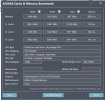Hi all
I set up a new server with a Proxmox VE installation:
- AMD Epyc 7301
- 64 GB DDR4 ECC memory
- 4x SSD in RAID5 with hardware RAID-Controller
I also created a Win10 KVM for code compiling:
- CPU=host and numa=1 (with all cores for testing)
- storage=virtio SCSI
- disk cache = I tested noCache, writeBack and unsafe
All VirtIO drivers, ballooning and guest agent are installed.
The problem now is that the compiling of the code takes more than twice the time as it takes on my few years old Intel i7 6 Gen. workstation with the same software installation and DDR3 memory. All cpu cores are unter full load while compiling.
So I took a system-benchmark on both machines and the VM was overall far better but the memory, which had less than half of the performance as on the workstation.
Next I compared the memory with sysbench on the Proxmox-server and the Workstation:
Sysbench command: sysbench --test=memory --num-threads=4 run
Result on the Proxmox-server (not in a VM):
Total operations: 19500912 (1949722.62 per second)
19043.86 MiB transferred (1904.03 MiB/sec)
Result on the Win10 VM in Windows subsystem for Linux:
Total operations: 8084654 (808256.14 per second)
7895.17 MiB transferred (789.31 MiB/sec)
Result on the Win10 VM booted in a Live Ubuntu:
Total operations: 17865358 (1786183.87 per second)
7895.17 MiB transferred (1744.32 MiB/sec)
Result on the Workstation on Win10 subsystem for Linux:
Total operations: 14111898 (1410967.57 per second)
13781.15 MiB transferred (1377.90 MiB/sec)
To me it looks like a driver problem, since the VM booted with Ubuntu gets nearly the full performance.
Does anyone have an idea what could cause this behaviour?
I set up a new server with a Proxmox VE installation:
- AMD Epyc 7301
- 64 GB DDR4 ECC memory
- 4x SSD in RAID5 with hardware RAID-Controller
I also created a Win10 KVM for code compiling:
- CPU=host and numa=1 (with all cores for testing)
- storage=virtio SCSI
- disk cache = I tested noCache, writeBack and unsafe
All VirtIO drivers, ballooning and guest agent are installed.
The problem now is that the compiling of the code takes more than twice the time as it takes on my few years old Intel i7 6 Gen. workstation with the same software installation and DDR3 memory. All cpu cores are unter full load while compiling.
So I took a system-benchmark on both machines and the VM was overall far better but the memory, which had less than half of the performance as on the workstation.
Next I compared the memory with sysbench on the Proxmox-server and the Workstation:
Sysbench command: sysbench --test=memory --num-threads=4 run
Result on the Proxmox-server (not in a VM):
Total operations: 19500912 (1949722.62 per second)
19043.86 MiB transferred (1904.03 MiB/sec)
Result on the Win10 VM in Windows subsystem for Linux:
Total operations: 8084654 (808256.14 per second)
7895.17 MiB transferred (789.31 MiB/sec)
Result on the Win10 VM booted in a Live Ubuntu:
Total operations: 17865358 (1786183.87 per second)
7895.17 MiB transferred (1744.32 MiB/sec)
Result on the Workstation on Win10 subsystem for Linux:
Total operations: 14111898 (1410967.57 per second)
13781.15 MiB transferred (1377.90 MiB/sec)
To me it looks like a driver problem, since the VM booted with Ubuntu gets nearly the full performance.
Does anyone have an idea what could cause this behaviour?






